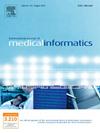Electronic Health Literacy among Older Adults: Development and Psychometric Validation of the Hebrew Version of the Electronic Health Literacy Questionnaire
IF 3.7
2区 医学
Q2 COMPUTER SCIENCE, INFORMATION SYSTEMS
International Journal of Medical Informatics
Pub Date : 2024-11-14
DOI:10.1016/j.ijmedinf.2024.105691
引用次数: 0
Abstract
Introduction
In the digital age, electronic health literacy (eHealth literacy) has become crucial for maintaining and improving health outcomes. As the population ages, developing and validating tools that accurately measure eHealth literacy levels among older adults in different cultures is essential.
Objectives
This study aimed to validate the Hebrew version of the electronic Health Literacy scale among Israelis aged 65 and older by assessing its psychometric properties, including content validity, construct validity, age-based convergent validity, internal consistency reliability, and test-retest reliability.
Methods
A sample of 628 Israelis aged 65 and older was recruited using convenience sampling. Participants completed an online survey consisting of the HeHEALS, demographic questions, items related to participants’ use of online health information sources, and measures of self-rated health, satisfaction with health, and perceived health compared to others. Psychometric properties were assessed using various statistical analyses.
Results
The HeHEALS demonstrated good content validity, construct validity, age-based convergent validity, internal consistency reliability, and test-retest reliability. Exploratory factor analysis supported a unidimensional structure of the HeHEALS. Significant positive correlations were found between HeHEALS and education, income, and subjective health measures. Users of online health information sources had significantly higher electronic health literacy scores than non-users.
Conclusions
The HeHEALS is a valid and reliable tool for assessing eHealth literacy among older adults in Israel, with potential applications in research and practice to promote digital health equity.
老年人的电子健康知识:希伯来语版电子健康知识问卷的开发与心理测量验证
简介在数字时代,电子健康素养(eHealth literacy)已成为维持和改善健康结果的关键。随着人口老龄化的加剧,开发和验证能准确测量不同文化背景下老年人电子健康素养水平的工具至关重要:本研究旨在通过评估希伯来语版电子健康素养量表的心理测量特性,包括内容效度、结构效度、基于年龄的收敛效度、内部一致性可靠性和测试-再测可靠性,在 65 岁及以上的以色列人中验证该量表:采用便利抽样法招募了 628 名 65 岁及以上的以色列人。参与者完成了一项在线调查,调查内容包括HeHEALS、人口统计学问题、与参与者使用在线健康信息来源相关的项目,以及自我健康评价、健康满意度和与他人相比的健康感知。心理测量特性通过各种统计分析进行了评估:结果:HeHEALS表现出良好的内容效度、结构效度、基于年龄的收敛效度、内部一致性可靠性和测试-再测可靠性。探索性因素分析支持 HeHEALS 的单维结构。HeHEALS 与教育程度、收入和主观健康指标之间存在显著的正相关。在线健康信息源用户的电子健康素养得分明显高于非用户:HeHEALS是评估以色列老年人电子健康素养的有效而可靠的工具,有望应用于促进数字健康公平的研究和实践中。
本文章由计算机程序翻译,如有差异,请以英文原文为准。
求助全文
约1分钟内获得全文
求助全文
来源期刊

International Journal of Medical Informatics
医学-计算机:信息系统
CiteScore
8.90
自引率
4.10%
发文量
217
审稿时长
42 days
期刊介绍:
International Journal of Medical Informatics provides an international medium for dissemination of original results and interpretative reviews concerning the field of medical informatics. The Journal emphasizes the evaluation of systems in healthcare settings.
The scope of journal covers:
Information systems, including national or international registration systems, hospital information systems, departmental and/or physician''s office systems, document handling systems, electronic medical record systems, standardization, systems integration etc.;
Computer-aided medical decision support systems using heuristic, algorithmic and/or statistical methods as exemplified in decision theory, protocol development, artificial intelligence, etc.
Educational computer based programs pertaining to medical informatics or medicine in general;
Organizational, economic, social, clinical impact, ethical and cost-benefit aspects of IT applications in health care.
 求助内容:
求助内容: 应助结果提醒方式:
应助结果提醒方式:


